#norse imagine
Text
Do any of you ever wonder if Camp Half-Blood accidentally brought in a demigod of a different pantheon before?
This would be especially hilarious if it happens sometime after The Last Olympian/Heroes of Olympus, where the gods are required to claim their kids quickly.
A whole day passes, and the new demigod needs to sleep in the Hermes Cabin and Percy is furious. Meanwhile, the Greek Gods are pointing at each other and shouting, contacting the most obscure of mini gods. Chaos erupts on Olympus as every deity in Greek Mythology is called upon and interrogated. Hermes hasn't run around so much in centuries.
Hecate sits in silence, fully aware of what's happening, but enjoying the show too much to intervene.
#does anyone want a fanfic of this?#idk if the norse and greek gods are even aware of each other's existence#but it's funnier to imagine that they aren't really#hecate keeps them secret from each other to avoid zeus having a power struggle against odin#or something similar like that#this would be absolutely hilarious#especially if the kid turns out to be a child of a norse sea god#percy jackson#percy jackon and the olympians#magnus chase and the gods of asgard#magnus chase#norse gods#greek gods#pjo#pjo tv show#pjo series#pjo books#heroes of olympus#percy is threatening the gods aka it's wednesday#the poor lost demigod is confused
4K notes
·
View notes
Text
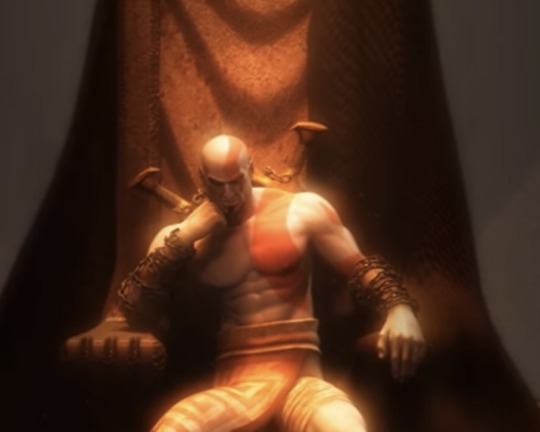
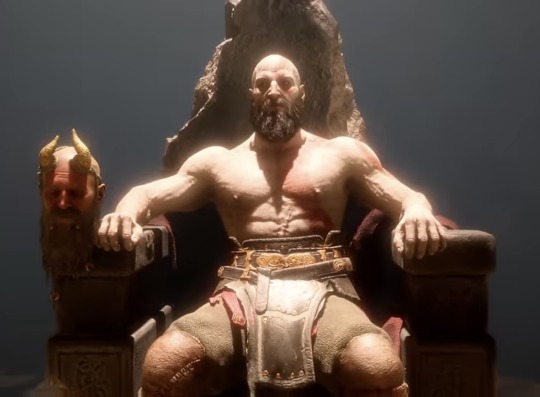
Kratos as The God of War
Kratos as The God of Hope
#Valhalla was everything I never knew I wanted from god of war#Kratos’ growth through the Norse games has been beyond incredible#Santa Monica deserve so much praise for their world building and character writing#Christopher Judge was PERFECTION again#the ending was better than I imagined#god of war#god of war spoilers#god of war ragnarok#god of war Ragnarok spoilers#god of war valhalla#god of war Valhalla spoilers#kratos#santa monica studio#Christopher judge
767 notes
·
View notes
Text
Being Married To Ivar Would Include...
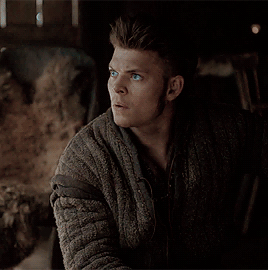
-Ivar being really protective over you in every single way possible. He would fight anyone who tries to mess with you or try and take you away from him.
-Him wanting to make sure that you are safe no matter what and always has someone go with you in the village does not matter if it is him or some other warrior going with you.
-During feasts he always has you sit with him. He does not want you to feel alone or have to sit with another man. So, he just wants you to sit with him.
-When you both are in bed, he loves to cuddle with you and be with you all throughout the night. Sometimes, he lets you cuddle him from behind but his most favorite is when he is laying down on his back and then you just lay your head on his chest.
-You both always having fun no matter what is going on. Everyone always notices that you both are always smiling around each other and making each other laugh at any time possible.
-Him always being super gentle with you. He is always gentle touching you. He always makes sure that when he hugs you or even when you both cuddle that he is being gentle and soft with you.
-His brothers have had a small crush on you at some point but have let it go because they had realized that you were staying with Ivar for a long time.
-His brothers liking you and thinking that you are a good fit for him and could handle all of his crazy tendencies.
-Ragnar and Aslaug liking you as well and treating you as if you are their own family and talking to you as such as well.
#norway#scandanavia#vikings#viking#imagines#nordic#vikings headcanon#vikings imagines#vikings fandom#norse#norsk#ivar#ivar lothbrok x reader#ivar x reader#ivar the boneless#ivar ragnarsson#ivar lothbrok#vikings ivar#vikings imagine#vikings x reader#vikings fic#scandanavian#history channels vikings
941 notes
·
View notes
Text
witches and pagans: there is so much we can do for Palestine
even if we don’t share the same faith- our prayer, rituals, and spells are powerful. our gods and spirits and ancestors have the power to intervene on our behalf, all we have to do is ask. they don’t take kindly to oppression, or politicians propping up genocidal regimes.
especially right now on Samhain, the veil is thin, and it’s the best time of the year to connect with the spiritual realm and the divine, and ask them for help. or take it into your hands- spells, hexes, prayers, and divinations, any and all of the above.
witches have done it before, we’ve helped to change the course of history. we can do it again.
#if enough of us can gather to... hex the moon… just imagine what we could do to bring safety and peace to Palestine#tagging so it reaches the relevant spaces ->#witchcraft#paganism#witchblr#paganblr#pagan#norse pagan#celtic paganism#kemetism#lokean#palestine#druid#magick#spells#samhain#polytheism#polytheist#helpol#hellenic polytheism#hellenic pagan#norse gods#norse paganism#pagan witch#wicca#tarot#kemetic pagan#heathenry#witchtok#p
219 notes
·
View notes
Text
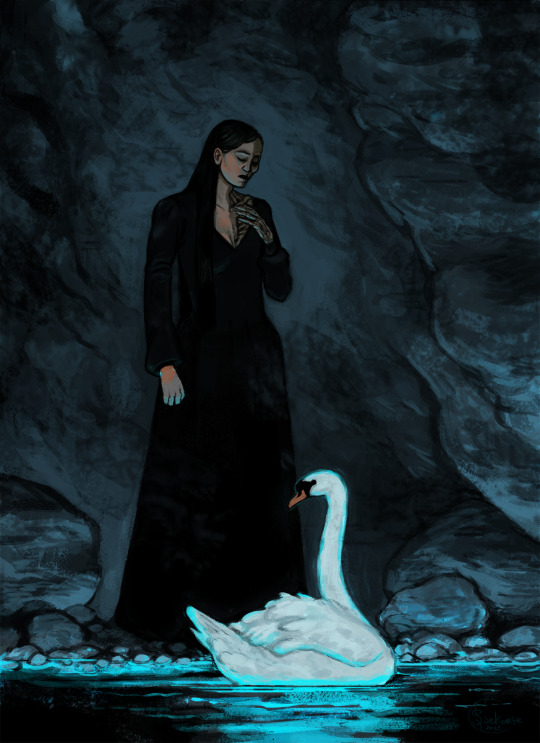

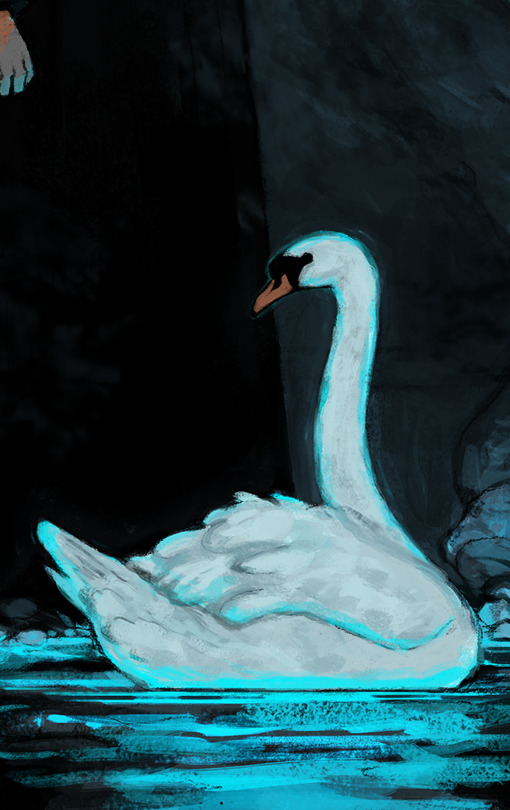
Hel in the underworld
(sharing some process pics under the cut)
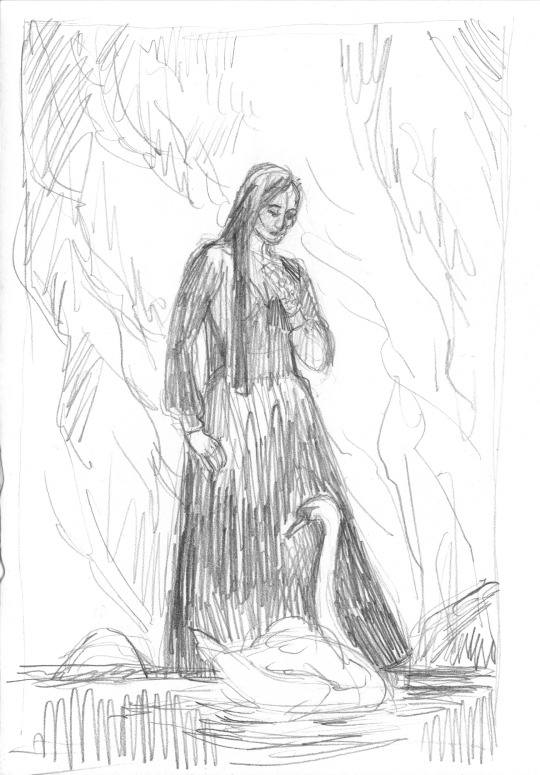
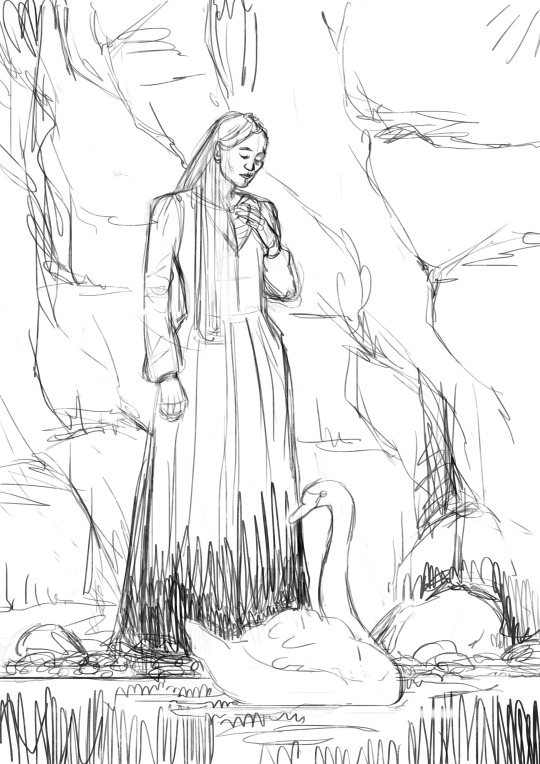
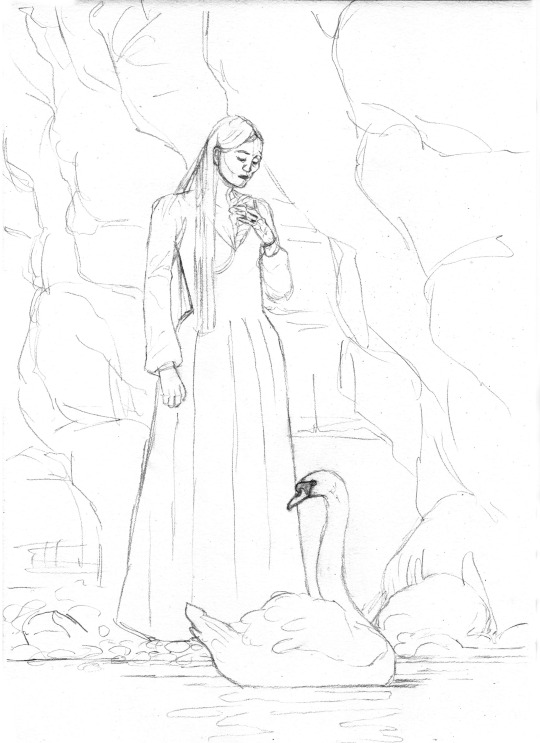
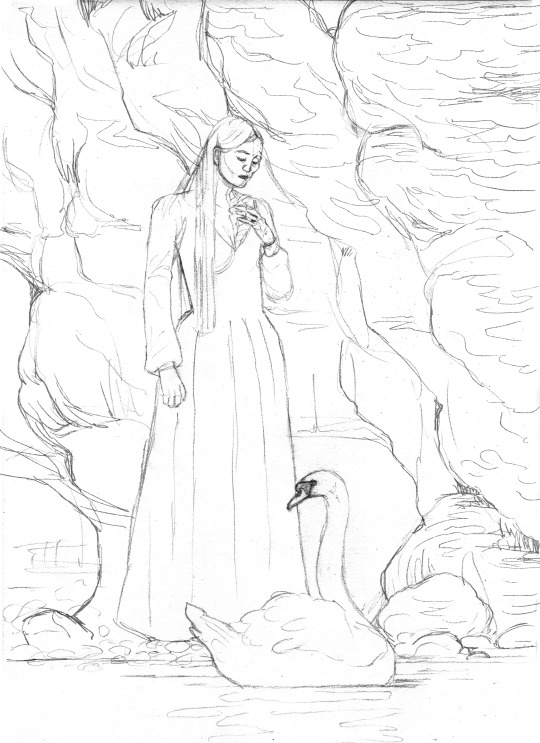
initial pencil sketch, digital sketch to fix proportions and composition, pencil lines, and scanned pencil lines with more detail added digitally
#norse gods#norse mythology#hel#underworld#swan#death#digital art#this one was a fucking pain#its been forever since i attempted to paint something from imagination without reference#and it took me the entire day yesterday to get the light i wanted :')))#i nearly binned it out of frustration halfway through#but i persevered
172 notes
·
View notes
Photo
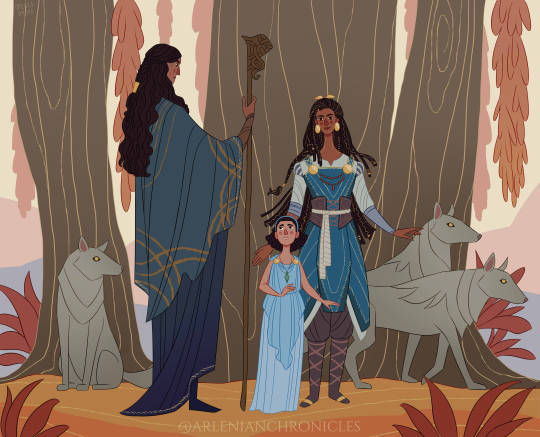

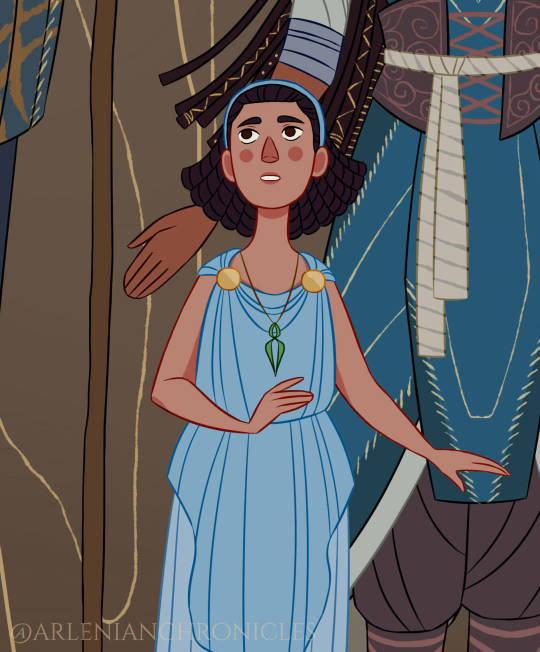

A little something inspired by Calliope’s adventures in Ironwood! Here she’s standing with Angrboda and one of the Giants I pulled from the myths: Eggdér, wolf-herder of the Jötnar.
In the Völuspá, Eggþér (or Egðir, which I find more visually pleasing loll) is a herder of the giantess in Ironwood, which is most likely a reference to Angrboda. He raises the kinfolk of Fenrir, and joyfully plays his harp while the red rooster Fjalarr crows to herald the onset of Ragnarök. Given that he’s mentioned with Angrboda, I just had to make him one of the returned Giants in my fic!
Since he’s a herder, I imagine all those wolves who led Atreus to Angrboda were actually Eggdér’s, but he bid them to watch over her if he was ever absent. He also plays a harp, so I gave him an affinity with music, and a possible teacher for Calliope given her own goddess-y musical abilities. As for his dynamic with her (and with Atreus), that’ll be revealed more in the story! XDD
Oh, and I should probably mention that Kratos and Sindri won’t be the only father/uncle/guardian figures in Calliope’s life lmaoo
#i wasn't sure what tattoos to give eggder#so i just imagine they're on his arms and neck#but hidden by his sleeves and hair loll#art#my art#god of war#god of war ragnarok#au#fanart#god of war fanart#fantasy#illustration#angrboda#calliope#eggder#ironwood#jotunheim#family#norse mythology#atreus#also i don't usually draw wolves loll this was technically my first time#so i'm sorry if they look a little weird!
462 notes
·
View notes
Text
Bro, imagine if all the gods from different religions and mythologies from different cultures were so competitive against each other to find out who was the best at what, so they created the Demigod tournament. Once every hundred or thousand years or so. The gods assemble their childrens camps of different mythological cultures, from the Greek mythology camp half blood all the way down to the American mythology camp half blood.
A team of demigods is handpicked by the gods to see would be worthy enough to compete. The contest is to test everything that makes a demigod. Strength, speed, agility, durability, reflexes, stamina, teamwork, power, etc.
Every time this event is held, it's a humongous deal in their world. It's the one time in centuries where demigods from other camps around the world come together, and both compete against one another and get to know one another. But the gods see this as an opportunity to see which mythology is better so they can rub the other gods' faces in it...All...The...Time.
The tests for this tournament change every century that the tournament is held, so no tournament is the same as the last, and it's changed by the gods who won the previous game.
All the gods set up the tournament but also had little temporary cabins for their children to sleep in, along with places where they can get food. The tournament is also recorded live for both gods' entertainment and for the demigods who are not participating. There's also commentary boxes with translators just in case, and it's protected by a dome shield of the gods' creation so that no threat of any mythology can intrude or interrupt when the tournament is held.
They also have games and activities for every demigod to do when those who aren't participating are not watching the tournament.
Let me know what you think
#rick riordan#percy jackson#percy jackon and the olympians#pjo series#pjo imagine#pjo fandom#pjo#pjo gods#mythology#greek mythology#norse mythology#ancient greek mythology#hindu mythology#egyptian mythology#fandom tournament#i hate and love my brain#greek gods#american gods#gods#percy jackson cabins#percy jackson universe#percy jackson imagine#pjo headcanon#pjo hcs#pjo greek gods#percy jackson headcanon#percy jackson hc#riordanverse#percy series#percy jackson tv series
121 notes
·
View notes
Text
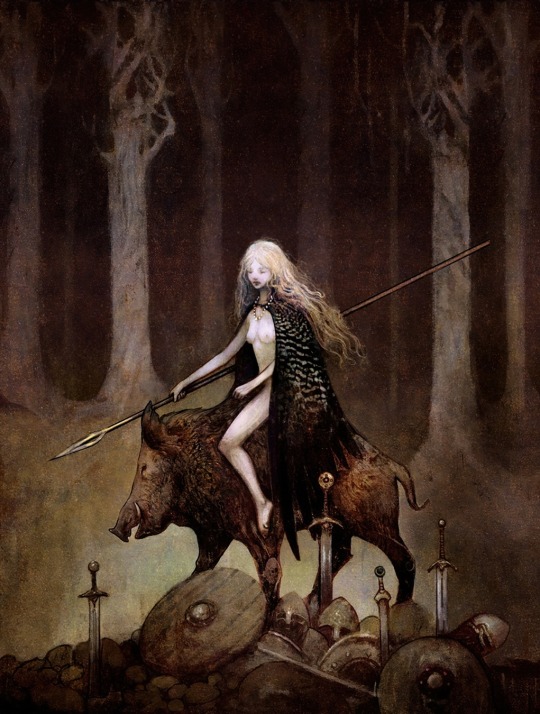
'Freyja & Hildisvíni' by Seb McKinnon.
#Art Of The Day#Art#AOTD#Seb McKinnon#Freyja#Hildisvini#Norse#Norse Mythology#Fantasy Art#Fantastical Art#Imaginative Realism#Female#Feminine#Goddess#Boar
432 notes
·
View notes
Text
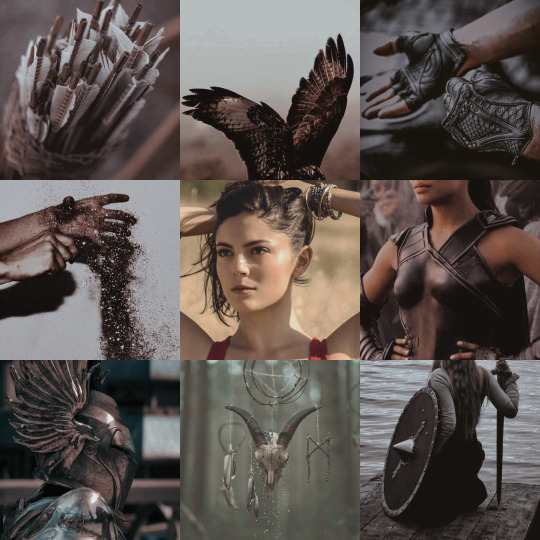
freyja || natasha 'phoenix' trace
"I will rain down every agony, every violation imaginable, upon you... I will parade your cold body from every corner of every realm, and feed your soul to the vilest filth in Hel, that is my promise!"
goddess of love, beauty, fertility, sex, war, gold, seiðr, queen of asgard, and queen of the valkyries
symbols: brisingamen necklace, chariot, coat of falcon feathers, hildisvíni, cats
the norse deities
#natasha trace#natasha phoenix trace#freyja!natasha trace#norse deity!natasha trace#natasha trace imagine#natasha trace moodboard#norse deity!daggers#top gun au#top gun moodboard#monica barbaro#tgmedit#moths moodboards
98 notes
·
View notes
Text

#loki norse mythology#loki mpreg#loki art#loki fanart#loki and thor#loki marvel#loki god of mischief#thor odison imagine#thor of asgard#thorki#thor
28 notes
·
View notes
Note
Would love to hear any thoughts on the codification of the poet-persona over time? 👀
Ok so in the spirit of the ask game, I am not checking any citations on this whatsoever, but if you want those lmk (though they uh. largely do not exist for rímur-poets specifically, because only me and Hans Kuhn have ever cared).
This is going to require some context because, as established, the number of living people who know and care about medieval rímur can be counted on my two hands. Probably without thumbs. So, rímur are a poetic form that developed in 14th cen Iceland, which look kind of ballad-y, in that they often use four-line stanzas with ABAB end-rhyme, though actually the ballad tradition in Iceland is quite distinct (on which, see Vésteinn Ólason, The Ballads of Iceland). End-rhyme was very exciting for Icelandic poets because it was only previously a thing in some uncommon types of skaldic metres, but rímur (as their name suggests) have end-rhyme as a defining feature and rapidly become The dominant form of poetry in Iceland until well into the 19th cen.
There are two very distinctive things about rímur, other than their metres: 1) they almost never tell 'new' stories; almost all rímur narratives are attested earlier in other forms, usually in prose, which can sometimes lead to the fun cycle of saga -> rímur cycle -> old saga is lost, new version is written based on the rímur -> more rímur are written based on the new saga -> repeat until the heat death of the universe; 2) as the form develops, it acquires introductory stanzas known as mansöngvar, a term which elsewhere usually means 'love poetry', although that's not really what they're doing here.
Mansöngvar are verses, sometimes in a different metre to the rest of the canto they're attached to, in which the poet speaks directly to the audience. In the medieval period, they're pretty short and often don't say more than 'look, I made you some poetry', but as time goes on, they get more and more elaborate, and the character of the poet begins to develop some quite distinctive traits. What's interesting here is that rímur were (certainly in the medieval period; less certainly later on) performed aloud, presumably by the poet, so there's definitely some questions to be asked about how accurate the poets' self-descriptions are when presumably the audience could go 'you're not pining away for love, Jón Jónsson, I've met your wife!'
So anyway, these mansöngvar are often linked to the medieval German Minnesänger tradition (er. The actual German word might be slightly different because I still don't speak German despite my PhD supervisor's pointed remarks), which is more overtly love poetry and which sometimes features the poet as an abject and despised lover of some cruel lady. This is something rímur-poets from the later medieval period and onwards have an incredibly good time with. You may be familiar with the story of Þórr wrestling with Elli, the personification of old age in the form of an old woman. There are at least two medieval rímur poets who have a whole extended passage about 'oh alas, when I was young I was a terrible flirt but now I'm old and no women like me, except oh no, I am being courted by this ugly old giant lady; Elli is the only ladyfriend for me now, wah'. it's very playful, it's very fun, it's drawing on this general sense that the poets put forward that they're poetically gifted, but romantically unlucky, which is kind of a Thing for poets across a lot of European literature (and probably more broadly, but I don't know much about that), and is especially pronounced in the earlier Icelandic sagas about poets, which usually feature poets failing to win the love of their life for various reasons (sudden attack of Christianity; sudden attack of magic seals; sudden attack of Other Guy With Sword; etc). So in evoking this, rímur-poets are situating themselves in this existing Image of the Ideal Poet, but doing so in a way that ties them into the specifics of the Norse literary/mythological tradition as well. Poets are also frequently old and tired (same, bro), and a statistically improbably number of them are also blind (although that might just be two guys we know about who were really prolific; most rímur are anonymous so it's hard to say. But it is perhaps convenient that this also links them to A Great Poet of Old, namely Homer).
The other thing that rímur-poets really like to bring up in their mansöngvar is the myth of the mead of poetry, which I will not recount here except to say that Óðinn nicked it from a giant, and also that some dwarves used it to buy safe passage off a skerry once, so it's poetically termed 'ship of the dwarves' because it's the thing that brought them safely across the sea. Every single medieval mansöngur, if one exists at all, refers to this myth in some way, even if it's just by having the 'I made you some poetry' bit use a kenning for 'poetry' that references the myth.* And poets have a lot of fun with this too! Iceland's a coastal community, they know about boats, so you get these extended metaphors about poets trying to board a boat to sample the mead of poetry and finding only the dregs because other, better poets got there first. Or they will describe the process of poetic composition in terms of ship-building: 'Here I nail together Suðri's [a dwarf name] boat'; 'Norðri's ship sets out from the harbour [= I'm about to start reciting the main bit now]'; 'the fine vessel has now been wrecked on the rocks [=I'm going to stop reciting now]'. They'll also speak of poetry as smíð, which means a work of craftsmanship, usually physical craftsmanship (obviously cognate with smithing in English), and of brewing the ale of Óðinn, so they're really into metaphors of physical craft when it comes to the intellectual craft of poetry, which I think is really neat.
*kennings = poetic circumlocutions, e.g. 'snake of the belt' is a sword because swords are vaguely snake-shaped and hang from a belt. Common poetry kennings are '[drink/liquid/ale/wine/mead] of [any of Óðinn's literally dozens of names]' e.g. 'Berlingr's wine', and the aforementioned 'ship of the dwarves' - poetic Icelandic has literally dozens of words for different kinds of ships and also literally dozens of dwarf names, so you can get a long way without repeating yourself.
So all these things that I've mentioned that poets like to bring up - old age, unluckiness in love, poets as craftsmen - become more and more tropified as time goes on, which in turn leads to these imaginative and extended reworkings of the metaphor. No longer can you just say 'I'm old and no one fancies me', no, it's 'My only assignations now are with Elli, wink wink, here's a long description of our date'. So you end up with this very codified image of The Ideal Rímur-Poet as an old man,* ideally blind, ideally unmarried, incredibly self-deprecating about his poetry, and because that's how everyone else talks, it's self-reinforcing.
*there is one (1) known female rímur-poet from the medieval period, the poet of Landrés rímur, who unfortunately didn't write many mansöngur stanzas but is doing her best with the 'unlucky in love' bit, although her lover (male) seems to have died rather than ditched her, which is a novelty.
Anyway, it's cool and weird and fun and as I say, only me and Hans Kuhn care, academically speaking.
#lol 1260 words here. which is. maybe 10 minutes of actual speaking time but OH WELL#asks I have answered#if there are bits that I haven't explained well lmk. I have a warped idea of how much the average person knows about Norse literary history#because I *am* on my Stan Rogers Wife Guy kick at the moment please imagine Jón Jónsson holding a guitar#also. lol. I am extremely fucking doxxable every time I talk about rímur so if you do know my full legal name. keep that shit to yourself.#but also. go read my phd thesis. if you like the shit jokes in this post you'll love 70k of them concealed in academese
33 notes
·
View notes
Text

Viking equipment from Graeme Davis' article "Viking -- Magic & Mayhem," presenting ideas for Norse-inspired PCs in D&D campaigns, in Imagine magazine 30, TSR UK, September 1985 (no signature; Mark O'Dell signed the other illustrations in this article)
#D&D#Dungeons & Dragons#viking#norse#Graeme Davis#Mark O'Dell#Imagine magazine#dnd#sword#longsword#helmet#thor's hammer#throwing axe#Dungeons and Dragons#TSR UK#TSR
118 notes
·
View notes
Text

#loki#loki odinson#loki of asgard#loki god of mischief#loki series#loki season 2#loki imagine#loki art#loki tom hiddleston#loki norse mythology#loki needs a hug#loki marvel#loki mcu#loki record of ragnarok#loki the god of mischief#loki variant#loki avengers#loki god of stories#loki god of time#loki glorious purpose#loki fanart#loki comics#loki costume#loki tv#loki finale#marvel#marvel comics#marvel villains
53 notes
·
View notes
Text
Ivar Having A Crush On You Would Include...
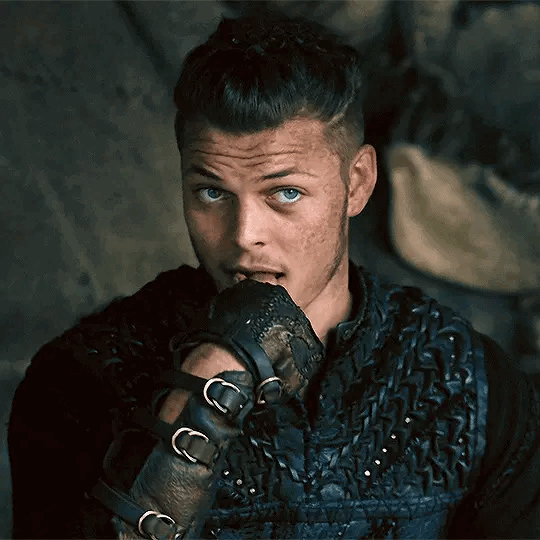
Ivar having a crush on you would be so obvious to everyone. Everyone would always bring it up to him and make fun of him for having this crush on you because they thought that he would never be able to pull you. He would always fantasize about you and the things that you both could do together. He would always get really nervous around you and try and talk to you but could never make a full conversation with you because he is so nervous around you. He eventually gets over this and starts to make conversations longer with you and even gives you gifts quite often.
#norway#viking#vikings#nordic#imagines#scandanavia#norse#vikings headcanon#vikings imagines#ivar#vikings fandom#ivar ragnarsson#ivar lothbrok#ivar lothbrok x reader#ivar x reader#vikings ivar#ivar the boneless#vikings fic#vikings imagine#vikings prompt#vikings x reader#vikings fanfiction#vikings tv#vikings series
423 notes
·
View notes
Text
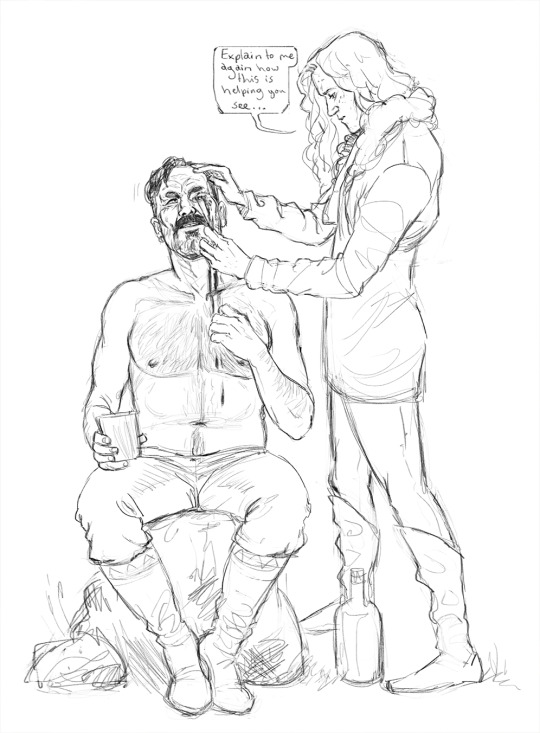
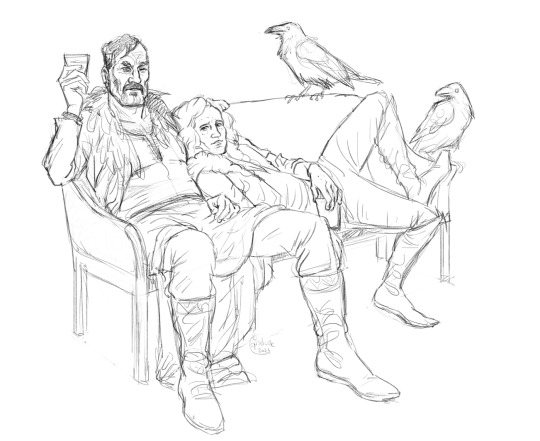
some drawings i did for funsies and for practise based on these photos
#norse gods#norse mythology#odin#loki#huginn#muninn#the other day i was thinking about how exactly odin sacrifices his eye and how he ends up with the sewn-up socket#i really like the idea of loki doing it and have odin sew shut loki's mouth later on and that'd be such a tasty little parallel#don't you think?#i wanted to sketch out that scene and when i saw the abovementioned photoshoot i knew exactly how :D#i wish i could draw like this from imagination but i cantt hahaha#idk how im going to pull off drawing an entire comic in this style without models :]]]#how to shoot yourself in the foot by having extremely ambitious goals and unrealistic standards: a fucking novel by saskia
198 notes
·
View notes
Text
the thing about writing is that all good stories boil down to "what if a guy were in situations how crazy would that be" and the second you forget that you're sunk
#I love themes as much as the next girl you need themes but themes cannot usurp just some guy in a situation#this post was born from me mentally comparing greek epics and anglo-saxon/norse epics and being like hmm#actually they are the same they're both like wow imagine a guy in a situation wouldn't that be soooo messed up
132 notes
·
View notes